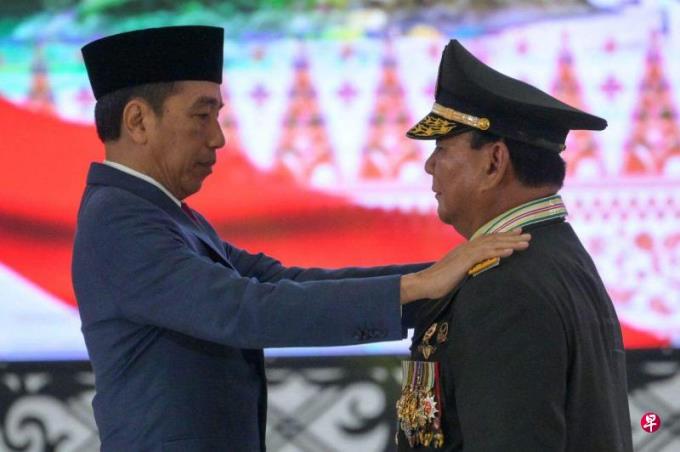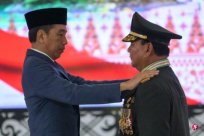
Under the influence of many social and economic adverse factors and system disadvantages, Indonesia's democracy can eventually consolidate. An important secret is to attach great importance to the art of "cooperation", especially the cooperation between the opposing camps, especially the opposing camps.EssenceAmong them, President Zoko can be described as well -known.
The five -year -old Indonesian election came to an end. Plaboor, who had accompanied the two times, finally won this time.Although it is still half a year before the official inauguration of the new president, there is no major suspense for peaceful transfer of power.In the world's fourth, the development of hundreds of ethnic groups has achieved democratic consolidation, and Indonesia has created a world miracle.
In this regard, India may be comparable to Indonesia, because India also achieves democracy consolidation under the conditions of a large population, diverse ethnic groups, and underdeveloped economy.But in terms of historical heritage and institutional model, India is actually better than Indonesia.After India's independence, there is no history of authoritarian rule, and at the same time, it also chose a parliamentary system that is more conducive to democratic consolidation; Indonesia has long -term authoritarian rule after independence, and chose the presidential system that is usually considered to be not conducive to democracy.Considering this, it is still necessary to tap the secrets of Indonesia to achieve democratic consolidation.
unfavorable institutional factors
What political spells did the author of Indonesia in the Lianhe Morning Post's speech on May 1, 2019?One article mentioned that, as a emerging democratic country, Democratic consolidation is facing three unfavorable factors: the underdeveloped economy, complex ethnic structure, and conservative religious culture.In terms of nature, the above three factors are economic and social factors.In addition to the adverse factors in socio -economic aspects, Indonesia's realization of democracy is also facing the challenges of political and institutional factors. It is concentrated in three items: authoritarian tradition, presidential system, and multi -party system.
First look at the authoritarian tradition.In 1966, through the support of the army, Suhado became the president and opened the 32 -year -old authoritarian government rule.He infiltrated the army into politics to stabilize the regime.He proposed that the army should have dual functions in a legal form.On the one hand, we must fulfill military functions and defend the country.On the other hand, it should be widely participated in politics and serves as the official position of the state.In order to solve the problem of military funds, the army's strength involves the economic field.These measures have a series of impacts that allow soldiers to control most regimes.Through the implementation of military politics, Suharto led the power of authoritarian governments into various fields.
See the presidential system.It is generally believed that compared with the parliamentary system, the presidential system is not conducive to consolidating democracy.In the early 1990s, Professor Hu An Linkz of Yale University listed the five major disadvantages of the presidential system.In Link's view, the presidential system may not only lead to a "dual legitimacy" conflict between the parliament and the president, but also may lead to "zero -sum game for winners."
The so -called dual legitimacy refers to both parliament and president that they are elected by the people, representing public opinion. Once there is differences between the two, it is easy to fall into a conflict that is difficult to reconcile, because there is no higher authoritative authority above the two.EssenceThis dual legitimacy rarely occurs under the parliamentary system, because the government (cabinet) under the parliamentary system is generated by the parliament and is responsible for the parliament, and the parliament has the highest legitimacy authority.
The so -called zero -sum game refers to the rules of the "winner" game rules in the election.Executive.Under the parliamentary system, although a single party has become an absolute majority and exclusive administrative power, power sharing and political alliances are more common, especially under the conditions of multi -party systems.
Finally look at the multi -party system.Compared with the two -party system, the operation of multi -party system is more complicated and more prone to political deadlock.Multi -party systems (especially fragmented multi -party systems) often make political parties unable to obtain stable election support. At the same time, the parliament cannot form a stable majority, which may bring the weakness of constraints and the government's instability.
Since the realization of democratic transformation in 1999, Indonesia has been a multi -party system.In the 1999 parliamentary election, 48 political parties were approved to participate in the election and 21 political parties obtained seats.The top five policies shared the votes of almost 87%of the votes, and the remaining votes belonged to many small parties. These small parties generally only have 1%or 2%of votes.In the 2004 parliamentary election, no political party also received half of the votes.In the 2019 parliamentary elections, the top two political parties have failed to exceed 20%.Therefore, no matter which political party candidate has won the presidential election, it is impossible to obtain most of the status in the parliament.
The secret is the art of practicing cooperation
Although the history of authoritarian authority has passed, the presidential system and multi -party system are still the disadvantages of Indonesia's democratic consolidation.In particular, the "Multiparty Presidentialism" combined with the multi -party system and the presidential system is more complicated and unfavorable to the American "BIPARTISAN PRESIDENTIALISM".Under such conditions, how to make democracy stable in Indonesia has become a realistic topic testing the wisdom of the people and politicians.Under the influence of many social and economic adverse factors and institutional unfavorable factors, Indonesia's democracy can ultimately consolidate. An important secret is to attach great importance to the art of "cooperation", especially the cooperation between opposing camps.Through the cooperation between politicians and between political parties, Indonesia successfully overcome many obstacles to democratic consolidation.Among them, President Zoko can be described as well -known.
In the 2019 election, the Democratic Party of the Democratic Party once again defeated the Plaboor of the Indonesian Sports Party.According to the institutional logic of the typical presidential system (US), the failed party cannot share the fruit of the election, and the winning party cannot share the selection fruit. This is the zero -sum logic of the presidential system that Lindz calls.Therefore, Plabovo did not have the opportunity to share political power.However, unlike the above logic, Zoko invited Plaboor into the cabinet after the victory, and asked him to serve as a high -weight national defense minister.
Coincidentally, Plabovo, who was elected this year, is also likely to continue Zoko's logic.According to media reports, Eddie, vice chairman of the Plaboor campaign team, pointed out that the first thing to do after Plabovo came to power was to adjust energy subsidies.In order to ensure the smooth implementation of the new policy, he will cross the party and strive to form a strong, tolerant and stable government.This may include inviting the Democratic Party and Campaign opponent Anis and Gandhar to join the government. Just as he was running to Zoko in 2019, he was invited to enter the cabinet.
Why do Zoko have to share the fruit of victory with Plabovo after the victory, and Plabowavo will continue Zoko's logic after the victory?The reason behind it may be the important secret to the consolidation of Indonesia's democracy, that is, in the multi -party environment, the ability to strengthen the presidential political alliance has been strengthened.Presidents can build a powerful ruling alliance with different political parties that are attracting different political parties and even competitors.The essence is to transfer some regimes and build the support alliance of the president in the legislature to overcome the inherent disadvantages of multi -party presidential system.
This multi -party presidential system is also known as the "Coalitional Presidentialism", and the sample in Latin America is Brazil.Since Brazil has formed a highly fragmented political party pattern since the democratization, the Presidential Party will always be in a small number of the Congress. Therefore, it is necessary to build a multi -party ruling alliance in order to obtain most support in Congress to achieve normal operation of stable governance and ensure the normal operation of the political system.EssenceIndonesia is a sample of multi -party presidents in Asia. Since its democratic transformation in 1999, Indonesia has guaranteed political stability.
Indonesia and Brazil belong to the sides of the earth. Similar dilemma in the system has made the two countries choose the same strategy to resolve the deadlock with cooperation.Democracy is the art of competition, and it is even moreThe art of cooperation.If you only know how to compete and do not know how to cooperate, democracy may appear fragile, especially in developing countries full of unfavorable conditions.
The author is an associate professor at the Department of Political Science and Administration of Central South China University of Ethnology




